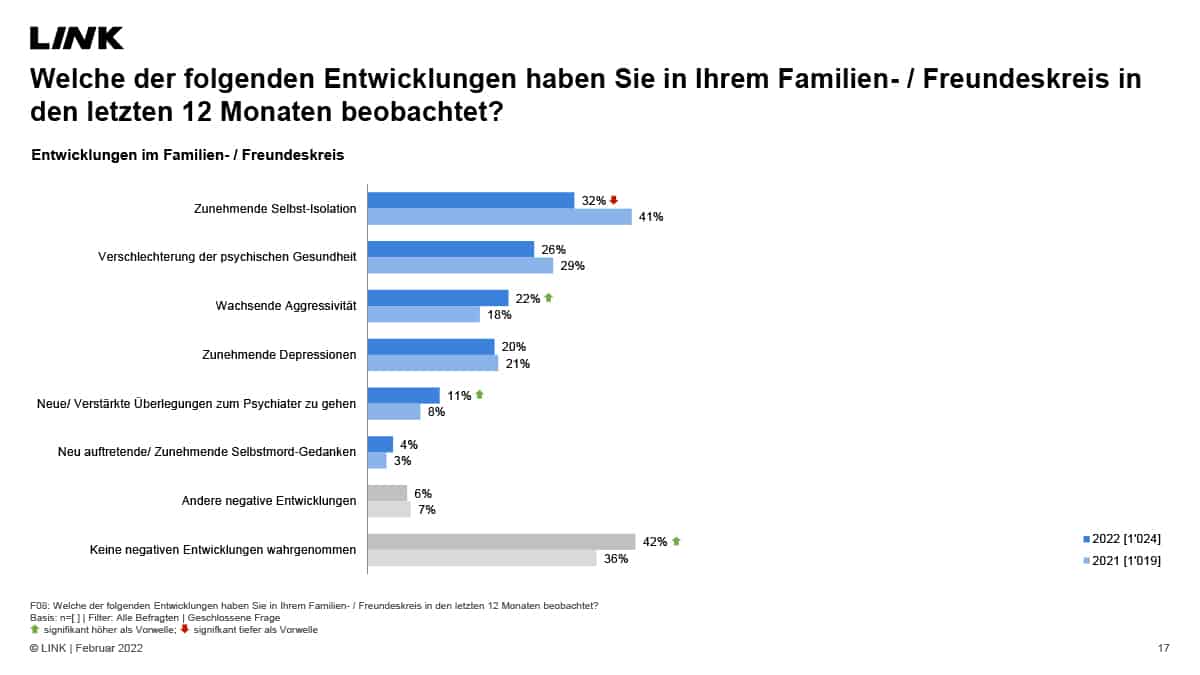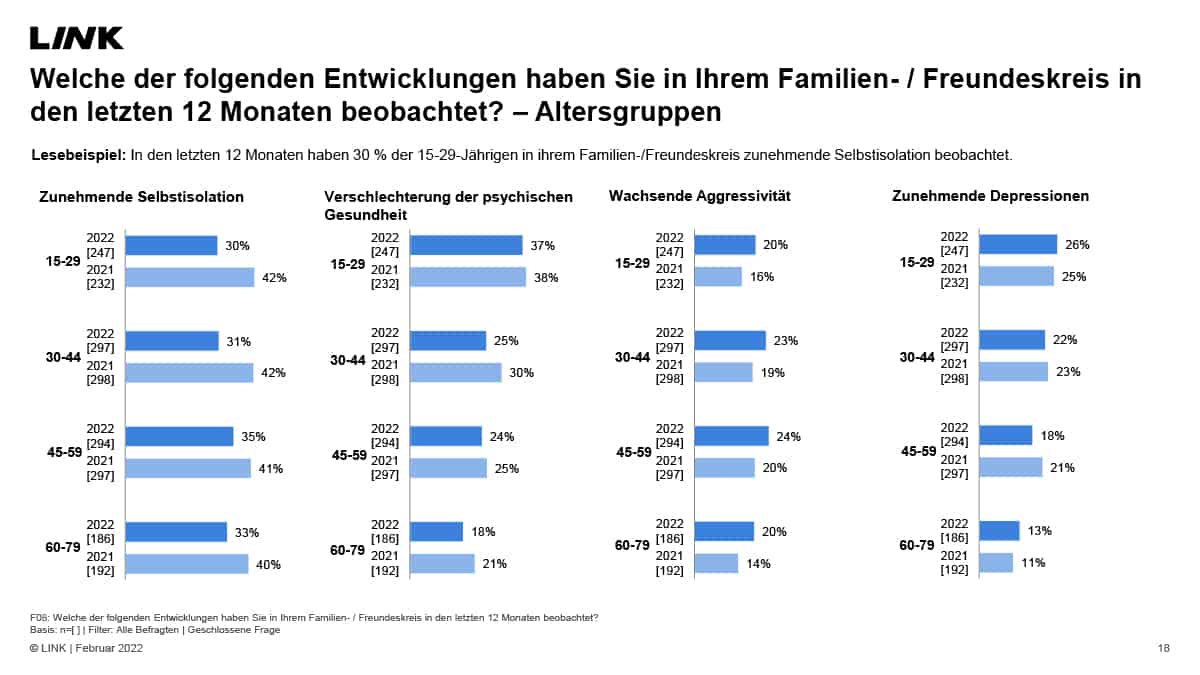Link study: Corona continues to negatively influence fears and worries
After two years, the Covid 19 pandemic remains an omnipresent issue in society. In addition to the impact on the economy and the healthcare system, the population has also experienced impairments in the area of mental health since the beginning of the pandemic. In order to investigate this, particularly through observations in their own immediate environment, in January 2021 Link [...]
The post Link study: Corona continues to negatively influence fears and worries appeared first on Advertising week m&k.
 After two years, the Covid 19 pandemic remains an omnipresent issue in society. In addition to the impact on the economy and the healthcare system, the population has also experienced mental health impairments since the beginning of the pandemic.
To investigate this, particularly through observations in their own immediate environment, Link conducted a study in January 2021 on the mental health of the population during the pandemic. A second wave of the population-representative survey, now conducted in January 2022, provides information on how Swiss people experience and assess the current situation.
After two years, the Covid 19 pandemic remains an omnipresent issue in society. In addition to the impact on the economy and the healthcare system, the population has also experienced mental health impairments since the beginning of the pandemic.
To investigate this, particularly through observations in their own immediate environment, Link conducted a study in January 2021 on the mental health of the population during the pandemic. A second wave of the population-representative survey, now conducted in January 2022, provides information on how Swiss people experience and assess the current situation.
Still strong impact on mental health
Among other things, the study participants were asked what developments they had observed in their own environment over the past twelve months. This shows that a large proportion of the population still observes, for example, increasing self-isolation or a deterioration in mental health. Growing aggressiveness is currently perceived even more strongly than in the first survey in 2021 - currently by 22 percent of respondents. These results show particularly clearly how strongly the pandemic has affected and continues to affect the mental health of the population.
Growing aggressiveness is currently perceived even more strongly than in the first survey in 2021 - currently by 22 percent of respondents. These results show particularly clearly how strongly the pandemic has affected and continues to affect the mental health of the population.
 If the results are split according to the age of the respondents, it becomes apparent that increasing self-isolation, for example, is perceived by about one third of all age groups in their own environment. A deterioration in mental health is perceived especially by 15- to 29-year-olds, with 37%, as are increasing depression (26%) or considerations of going to a psychiatrist (19%). These results may be an indicator that younger generations in particular are more vocal about mental health issues.
If the results are split according to the age of the respondents, it becomes apparent that increasing self-isolation, for example, is perceived by about one third of all age groups in their own environment. A deterioration in mental health is perceived especially by 15- to 29-year-olds, with 37%, as are increasing depression (26%) or considerations of going to a psychiatrist (19%). These results may be an indicator that younger generations in particular are more vocal about mental health issues.

Just under a third report an increase in fears and worries
Fears and worries about oneself continue to be reported more frequently, but at 31 percent, the figure is lower this year than in the first wave. It can be seen that this trend occurs in all age groups. At 37 percent, 15- to 29-year-olds currently report the greatest increase in fears and worries. Many respondents also report more fears and worries among parents and grandparents, as well as among children in their own environment, but these figures are lower than in last year's survey.
Jyounger generation: Strong increase in digital media consumption
A particularly significant increase was perceived in the area of digital media consumption - by 44 percent of respondents. Although the perceived increase here is lower than in wave 1, it is still most clearly perceived by 15-29 year-olds - at 51 percent, more than half of them report a perceived increase in digital media consumption in their own environment.
Professional aspects
Although people who work with other people generally observe a greater improvement in all the factors surveyed, such as the productivity of colleagues or their own productivity, than in the previous survey, the proportion of respondents who see a deterioration in all aspects is still high. For example, 29 percent of respondents observed a deterioration in the mood of their superiors, and 35 percent perceived the working atmosphere to be worse. Asked in general about their own quality of life, respondents report a balanced picture, but a substantial proportion of participants still report a deterioration in all three areas of nutrition, sleep and partnership.
For the Link Study 1024 respondents were asked via interviews to compare their current situation with that in January 2021 (or January 2020 in the first wave). The survey was conducted between January 19 and 24, 2022. For more insights and the full charts on the study, visit Link.ch. The post Link study: Corona continues to negatively influence fears and worries appeared first on Advertising week m&k.









